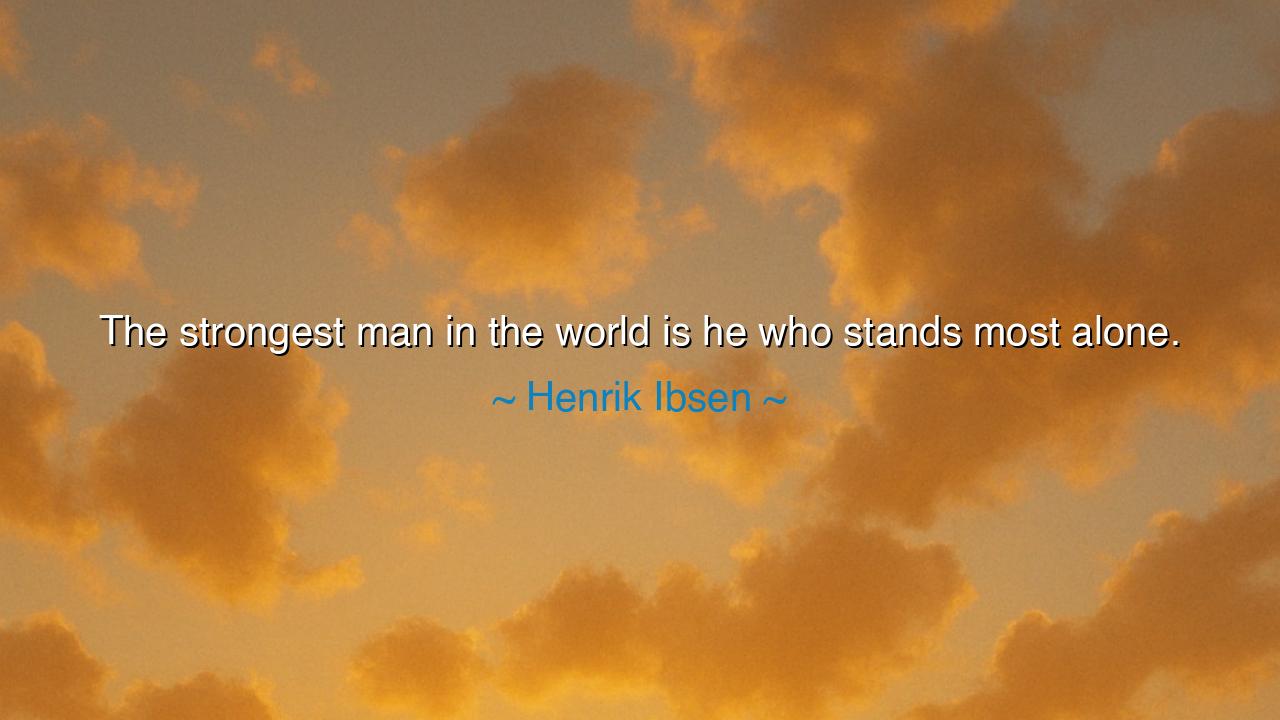
The strongest man in the world is he who stands most alone.






When Henrik Ibsen declared, “The strongest man in the world is he who stands most alone,” he did not speak of physical might or worldly power. He spoke of a strength rarer, deeper, and far more difficult to possess — the strength of conviction, the courage to stand firm when the world turns its back. His words echo like a solemn drumbeat through time, reminding us that true greatness often walks in solitude. The one who dares to uphold truth, even when surrounded by lies; the one who refuses to bow to the will of the crowd — such a soul stands not in weakness, but in moral power, the kind that cannot be bought, silenced, or bent.
This quote comes from Ibsen’s play "An Enemy of the People," in which the protagonist, Dr. Stockmann, discovers that the town’s prized public baths — the source of its wealth and pride — are contaminated. When he tries to reveal the truth, the townspeople, fearing loss and ruin, turn against him. His honesty becomes his exile, his truth-telling his crime. In the face of scorn and betrayal, Stockmann declares these immortal words: “The strongest man in the world is he who stands most alone.” Thus, Ibsen teaches that integrity often isolates the righteous, for to stand by one’s principles in a corrupt world is to stand against the tide. Solitude is the crucible of moral courage.
Throughout history, those who have changed the world have walked this path of sacred isolation. Consider Socrates, condemned by his city for questioning its false wisdom; or Galileo, imprisoned for daring to proclaim that the Earth moves around the Sun. Think of Rosa Parks, who in the stillness of her defiance refused to rise from her bus seat, and in doing so, set a nation in motion. Each stood “most alone,” and yet, in that solitude, they found the strength to awaken the conscience of humanity. Their loneliness was not a sign of weakness — it was the sign of unbreakable spirit.
Ibsen understood that the world often punishes those who speak truth too early. The mob seeks comfort, not clarity; conformity, not courage. To stand alone, then, is not to reject others, but to remain faithful to one’s own soul when others have abandoned theirs. Such a man, or woman, becomes a pillar against the storm — bruised, perhaps, but unbroken. Ibsen’s hero is not a recluse fleeing the world, but a warrior facing it with unyielding integrity. In his solitude lies his power, for his strength comes not from applause but from conviction.
The origin of this quote, therefore, lies not only in Ibsen’s philosophy of individuality but in his rebellion against social hypocrisy. Living in 19th-century Norway, Ibsen saw how societies crushed the individual beneath the weight of tradition and comfort. His works — from A Doll’s House to An Enemy of the People — called for authenticity, for men and women to live by truth rather than approval. He believed that only when a person can endure the loneliness of conscience can they claim the title of “strong.” For strength without integrity is but brute force; only moral strength endures time.
Yet, this strength comes with a cost. The one who stands alone must face misunderstanding, ridicule, and exile. But solitude, when borne for truth, becomes a forge of the spirit. In that quiet space, stripped of praise and belonging, a person discovers who they truly are. Just as the mountain stands unmoved though the winds rage around it, so must the strong stand rooted in principle, even when the storms of opposition roar. This is not arrogance — it is faithfulness to what is right, even when it is difficult, even when it hurts.
Let this be the teaching: Do not fear to stand alone, if what you stand for is true. There will be times when silence is demanded of you, when the crowd mocks or abandons you. Stand still. There will be moments when compromise seems easier than conviction. Stand firm. The company of truth is greater than the comfort of the multitude. For as Ibsen teaches, the strongest are not those who dominate others, but those who refuse to betray themselves.
And when you stand in that sacred solitude — when the noise of the world fades and only the quiet voice of your conscience remains — know this: you are not truly alone. You stand with every soul in history who chose integrity over acceptance, courage over comfort, and truth over peace. That is the strength that moves the world forward.






AAdministratorAdministrator
Welcome, honored guests. Please leave a comment, we will respond soon